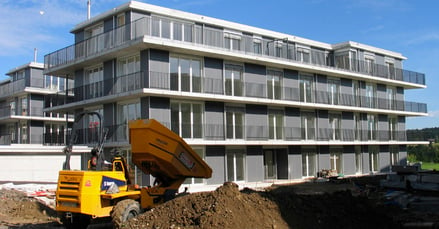The study bases its calculations on an average mortgage of 690,000 francs and a deposit of 270,000 francs, the Blick newspaper reported online on Tuesday.
Assuming a fixed interest rate of 1.5 percent, payments including interest and amortization would come to about 2,615 francs a month.
Moneypark estimates the same kind of property would cost an average of 4,240 francs a month to rent, Blick said.
A renter who invests 270,000 francs rather than using this sum for a down payment for a house will derive an income that partly offsets the difference between buying and renting, the financial services firm acknowledges.
But Moneypark says the monthly difference in costs when all factors are considered would still be 1,500 francs a month.
It estimates that buying remains cheaper for homes priced at less than the average price and for those that are more expensive, where savings can be proportionately greater, Blick reported.
The risk of property prices collapsing is not on the cards, as current predictions call for a modest rise in home prices over the coming year, Moneypark said.
The only exception would be luxury apartments, where the market is seen to be fragile.
However, Moneypark CEO Stefan Heitmann told 20 Minuten newspaper that banks have become more picky about financing homes in response to tightening of regulations.
Coming up with the minimum deposit remains a hurdle for many buyers.
The banks base their mortgage calculations on the market value of the home and not its purchase price, which can mean a higher deposit is required.
UBS, Switzerland’s largest bank, warned earlier this year that there was a growing risk of a real estate bubble developing in Switzerland.
Historically low interest rates have induced more Swiss to become home owners.
But in 2013 only 37.5 percent of all permanently occupied buildings were “inhabited by the owners themselves”, according to the Federal Housing Office.
While this rate is higher than it was 20 years ago, it remains the lowest in Europe, the office said.



 Please whitelist us to continue reading.
Please whitelist us to continue reading.
Member comments